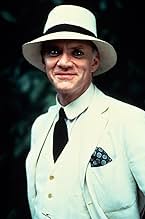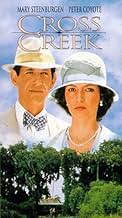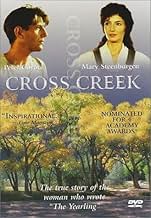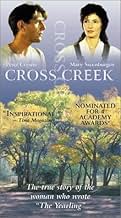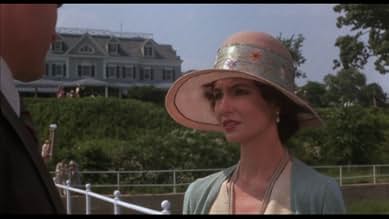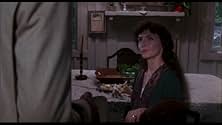Ajouter une intrigue dans votre langueIn the 1930s, Marjorie Kinnan Rawlings moves to Florida's backwaters to write in peace. She feels bothered by affectionate men, editor and confused neighbors, but soon she connects and write... Tout lireIn the 1930s, Marjorie Kinnan Rawlings moves to Florida's backwaters to write in peace. She feels bothered by affectionate men, editor and confused neighbors, but soon she connects and writes The Yearling, a classic of American literature.In the 1930s, Marjorie Kinnan Rawlings moves to Florida's backwaters to write in peace. She feels bothered by affectionate men, editor and confused neighbors, but soon she connects and writes The Yearling, a classic of American literature.
- Réalisation
- Scénario
- Casting principal
- Nommé pour 4 Oscars
- 2 victoires et 7 nominations au total
Avis à la une
Eighty years ago, Marjorie Kinnan Rawlings gave up everything to move to Florida and write. She went as far away from everything as you could go. In the land of orange groves, cypress trees, and wildlife abundant, she found the inspiration she needed. This is her story.
It is peppered with colorful characters that lived in the backwoods of Florida, a place that hardly exists anymore with all the development. It featured outstanding performances by Rip Torn as her neighbor, Peter Coyote as the one who was trying to win her heart, Dana Hill as the young girl that inspired "The Yearling," and Alfre Woodard in one of her first roles.
Torn and Woodard got Oscar nominations for their performances.
One of the most impressive features of the film, other than showing the beauty of Florida that is long gone, is the respect shown for the land by Rawlings. Any Native American would be proud of her respect for the land.
It is an inspirational family film that is worth revisiting over and over.
The visuals are beautiful, mostly shot on location in Cross Creek. It certainly evokes this part of Florida. (I grew up about 25 miles from the setting.) Some negatives lower my rating. But despite these, I still highly recommend the film.
Though many like the score, I found it mostly sappy, the only exceptions being the music created by the characters.
Summer never seems to come. Once we see MKR wipe her brow. We get no sense of the oppression of the summer heat and humidity.
But likewise, winter never seems to come. For goodness sake, when you're lighting fires to protect orange trees, that's because it's FREEZING! Those orange trees won't be hurt above about 25F. And freezing weather in Florida is normally accompanied by wind. This may not seem like much to those who live farther north, but it requires more serious clothing than most of the characters don. Yet none seem to notice that it's cold. And MKR's house wouldn't have been so well heated that she could sleep in that weather with only light clothes and covers.
It never gets muddy. The movie shows some torrential downpours, yet when the characters get back out on the roads and paths, it's all dry and neat. That doesn't happen in the swamp.
And it never seems to get buggy. We hear a couple of mentions of mosquitoes but mostly they don't seem like a big problem. People just sit and walk around with no sign that they notice.
Every creative person goes through the struggle to find their voice, and Cross Creek is about a city-bred writer who runs away to the country to live an ascetic life with her typewriter. She expects her isolation and alienation to "prod the muses" but instead finds these new people and this new land to draw her in until they and it become the soul of her writing.
The natural, understated tone of the film allowed for a human resonance I've rarely seen in mainstream Hollywood fare. And while Mary Steenburgen and Peter Coyote are perfectly fine, Rip Torn and Alfre Woodard's performances absolutely floored me. They respectively brought Marsh Turner and Geechee to life with such abandon and clarity, it's some of the finest acting I've witnessed on film, period.
I revisit Cross Creek every few years and it always holds up stylistically (Leonard Rosenman's score is timeless). Marjorie Kinnan Rawlings symbolizes America itself, in my opinion, so concerned with pleasing its own, yet progressively exposed to a foreign world that ultimately will shape its real identity.
It's a universally human story and, like I said before, I really connect with this little film, and appreciate Director Martin Ritt's courage in making it the way he did. I can't guarantee that others will necessarily feel the same way, but I always recommend Cross Creek to friends, be they creatives or not.
Le saviez-vous
- AnecdotesNorton Baskin, portrayed in the movie by Peter Coyote and the real life second husband of the source novelist and film subject Marjorie Kinnan Rawlings, has a small role in the movie as the man in a rocking chair giving directions to Marjorie to the hotel. Baskin also acted as a consultant to the picture.
- Citations
[last lines]
Marjorie Kinnan Rawlings: [voiceover] I had become a part of Cross Creek. I was more than a writer. I was a wife, a friend, a part of the earth. Who owns Cross Creek? The earth may be borrowed, not bought, may be used, not owned. It gives itself in response to love and tenderness, offers its seasonal flowering and fruiting. Cross Creek belongs to the wind and the rain, to the sun and seasons, to the cosmic secrecy of seed, and beyond all, to time.
- ConnexionsFeatured in The Oscars (2020)
Meilleurs choix
- How long is Cross Creek?Alimenté par Alexa
Détails
Box-office
- Montant brut aux États-Unis et au Canada
- 200 000 $US



